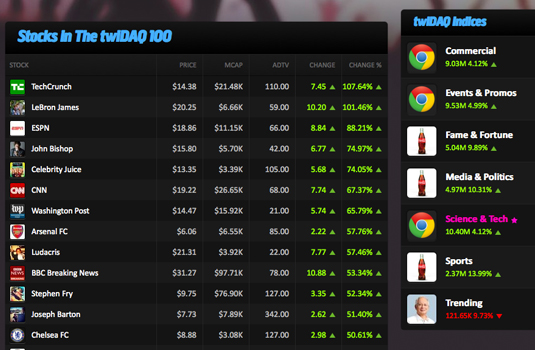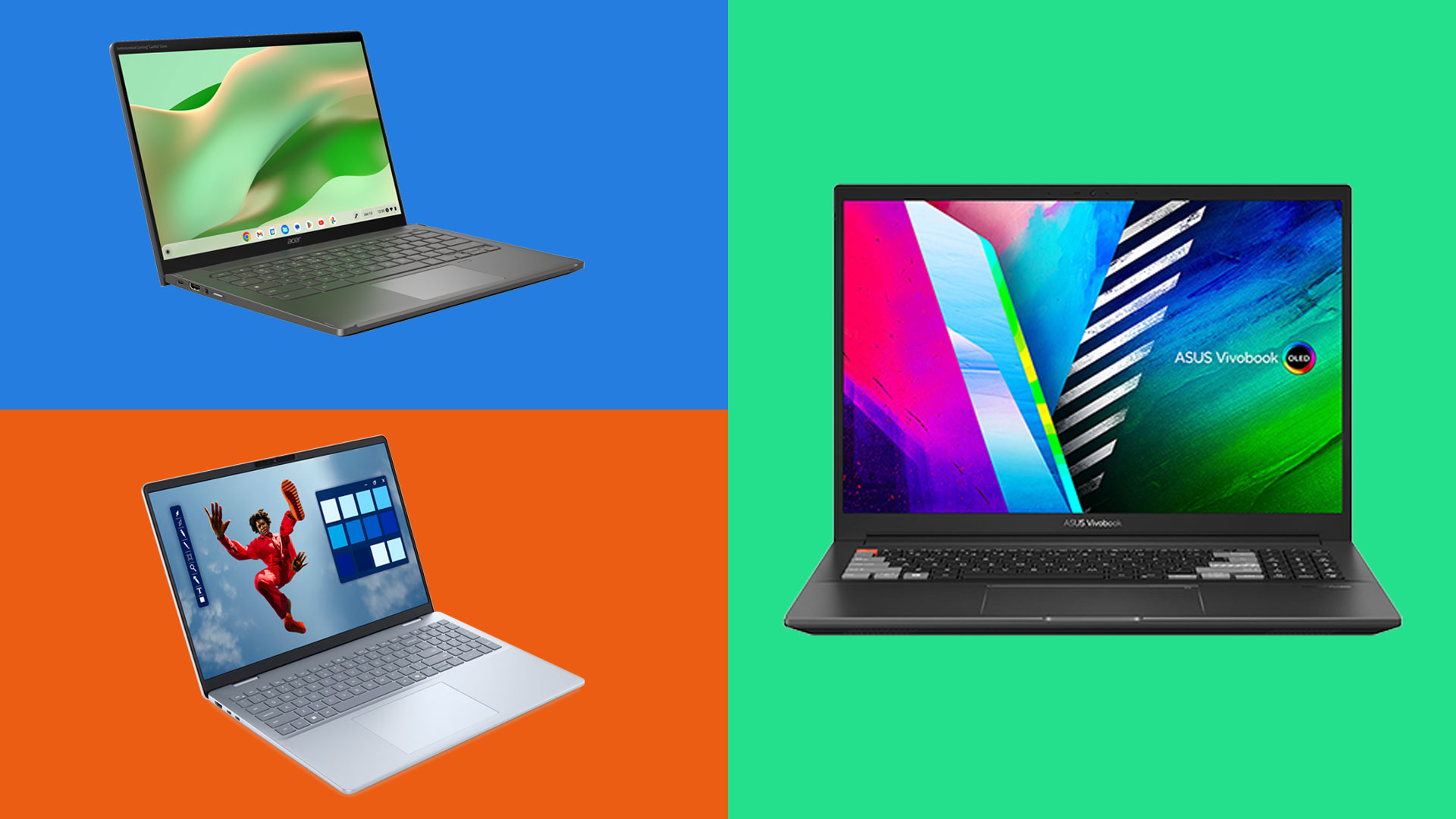twiDAQ: a new online marketing tool based on a fantasy stock exchange
Can a game based on Twitter unlock valuable information about public opinion?
Sign up to Creative Bloq's daily newsletter, which brings you the latest news and inspiration from the worlds of art, design and technology.
You are now subscribed
Your newsletter sign-up was successful
Want to add more newsletters?
twiDAQ is a fantasy stock exchange game based on Twitter that, in time, promises to provide valuable and unique data to social media managers and marketers. We spoke to founder Jim Morrison.
What is twiDAQ, and how does it work?
twiDAQ is a few things...
Today it's a massively-multi-player stock exchange game that you can play at twidaq.com or download free from the Apple AppStore.
It's hopefully fun and addictive like any good game but it's also tied to reality like nothing else on the market.
Your success at twiDAQ relies heavily on your understanding of zeitgeist; who's going up in music, film, politics or sport... and who's going down.
Basically you're trading shares in Twitter accounts, trying to predict changes in opinion and popularity of the companies and celebrities you're trading.
twiDAQ is designed to do two more things though; first to give companies and celebrities a way to engage with and reward their most loyal followers. We're going to do this through a 'share dividend' model... allowing brands and celebrities to distribute real-world perks to their shareholders.
Sign up to Creative Bloq's daily newsletter, which brings you the latest news and inspiration from the worlds of art, design and technology.
We're also talking to a few broadcast and media companies about mining the data that the exchange generates. We're sitting on a real-time, massively crowd-sourced stream of the public sentiment of the world's great and good. That data is exceedingly interesting - especially when tied to a real-world live event like a football match, X-Factor or a political debate.
What gave you the idea to build it?
To be honest that's still top-secret.
twiDAQ was born out of needing to produce an example of another idea. But the way the idea of twiDAQ ties into the real world is what has turned it from an idea to an investable company in its own right. I may never get back to the original idea - I'm finding twiDAQ far too compelling at the moment.
When did you start working on it, and what has happened since then?
Years ago! It's been a labour of love and we're now on our third iteration.
The first version exploded, briefly. We'd reached 1,000 people a day signing up and knew two things; it wasn't scalable and it wasn't addictive.
So we've taken our time and worked to solve those two problems. We sought a little investment to match some funding I was able to muster and we set to work on the platform.
Last year we rolled out a completely re-modelled JSON API-based platform for twiDAQ. It's fast and robust and anyone can go to dev.twidaq.com and start using it today. Both our iPhone App and website use the JSON API - not to mention the dozen or so third party apps we know are in development.
We tested the API and Twitter integration on up to 1.5 million stocks and while there's a long way still to go we're pretty happy that we're starting with a solid foundation.
Then last year we set to work on gameplay.
In January this year we rolled out a whole new game; five full levels, hundreds of individual challenges and a whole system of power-ups, promotions, rewards and points.
To be honest, despite little bursts of interest and growth in the past this is the first time anyone's actually seeing the game itself.
We're still only just getting started.
Do you see twiDAQ as having a future as a market research tool?
Absolutely.
From a rewards perspective, if you're a social media manager these days it's really tough to identify and reward your most loyal followers; your uber-fans. We're offering a very clear way to segment your following - something no-one else is able to do as accurately or in such an up-to-date way.
From a sentiment perspective I believe this even more strongly. twiDAQ tracks lots of Twitter metrics like lots of other brand-sentiment and social analytics packages do... but it has a couple of key distinctions.
Firstly its internal metrics are more quantitative and explicit; we track positive and negative sentiment and we track the volume and timing of trades which gives us a valuable quantity to apply to any assessment.
Secondly twiDAQ is both massively crowd-sourced and real-time - which makes it self-policing. Our observations from testing are that at scale the market begins to truly reflect public opinion about real-world issues.

Consider what happens to an energy company or supermarket when it issues a quarterly profit warning. We all recognise the real-world implications that drive the real stock markets.
Now consider tens of thousands of people live trading X-Factor contestants while they're on stage.. or football players during a big match. Opinion will affect twiDAQ share-price changes in just the same way.
Real people's opinion matters. Greatly. To lots of companies. All we're doing is quantifying it.
Last year you posted a long list of adjustments that you were going to make. How has that gone?
That's right - I posted a bit of a manifesto - "twiDAQ is Broken".
It's gone fantastically - I think. The key message here was that while we felt we'd mastered the scalability and flexibility of the platform we hadn't yet addressed even the most basic gameplay.
The twiDAQ that you see today at twidaq.com or that you download from the AppStore isn't finished. Not by a long chalk. But it is now a game - not just a concept.
Most importantly; twiDAQ is now fun and addictive.
I'm not just saying that. I've got the stats and the regular feedback from players to prove it.
As I promised I would in that article we've developed the storyline underpinning the game, we've built a whole series of levels, challenges, a points-based game engine, a whole host of power-ups you can buy from your character and we're adding to the gameplay every week.
What kind of feedback have you had from your user base?
Honestly, it's been amazing. We still feel like we're in beta but everyone seems to be really enthusiastic and all of the folk who know twiDAQ of old have been really positive about the changes we've made to the gameplay.
We've still got a huge way to go to polish the game, explain how it all works and make it both fun for the first-timers and enduringly fun for those who've built up their fortunes.
People are great about voicing their ideas - and hopefully we're responding pretty quickly with new features.
Through everything though the word I hear most is 'addictive'... which is really all the feedback we need.
What's your plan for twiDAQ over the next year?
This year is all about growing the number of traders.
We're aiming to be 36,000 traders minimum by this time next year. Of course if it grows like it has in the past then we could reach that by the summer.
What's important for the folk who're playing is that the more people who're trading the more fun it is for everyone because the more volatile the market becomes.
It's also an important milestone because we think with ~36,000 traders we'll be able to support a staff, be revenue neutral and if anything; starting to grow.
Next year, 2015, is all about developing the rewards and analytics sides of the business although we're actually already in talks with some big companies and media outlets about tie-ins with real-world events.
Finally - I have my own geeky goal: to reach 86,400 shares traded per day. That's 1 trade per second. If we ever reach that then I'll know we've arrived!

The Creative Bloq team is made up of a group of art and design enthusiasts, and has changed and evolved since Creative Bloq began back in 2012. The current website team consists of eight full-time members of staff: Editor Georgia Coggan, Deputy Editor Rosie Hilder, Ecommerce Editor Beren Neale, Senior News Editor Daniel Piper, Editor, Digital Art and 3D Ian Dean, Tech Reviews Editor Erlingur Einarsson, Ecommerce Writer Beth Nicholls and Staff Writer Natalie Fear, as well as a roster of freelancers from around the world. The ImagineFX magazine team also pitch in, ensuring that content from leading digital art publication ImagineFX is represented on Creative Bloq.
